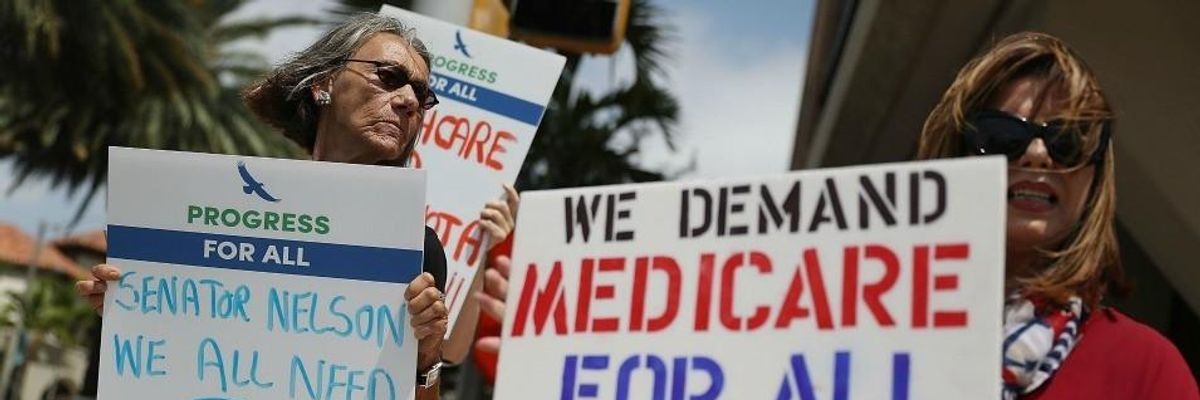The 2020 election cycle has only just begun, and although no single leader has emerged from a pack of democratic contenders -- an issue has certainly emerged, right out of the gate, as a standout in the race: Medicare for All.
If the earliest campaign days are an indication of what's to come, all candidates are going to have to spend the next two years clearly defining their position: Do they stand on the side of the health insurance industry and continued human suffering? Or do they stand on the side of nurses and everyday people who are demanding real, lifesaving health-care reform?
Try as elected officials might to pledge allegiance to both corporations and to people, it won't work that way. Not anymore.
Try as elected officials might to pledge allegiance to both corporations and to people, it won't work that way. Not anymore.
Our patients' lives and life savings will either continue being sacrificed--or there will be guaranteed health care as a human right. The Affordable Care Act (ACA) has already served as a great example of the fact that there is no workable in between.
The 2020 candidate positioning around Medicare for All is already happening -- from Kamala Harris' "let's move on" from health insurance comment, to pseudo-candidate Starbucks billionaire Howard Schultz advocating for endless tweaks to the unfixable ACA. Rest assured nurses will be holding all candidates accountable for the positions they take.
As leaders in the grassroots movement for single payer, registered nurses are looking forward to Medicare for All's role in the coming election. America has not yet had a presidential election at a time when Medicare for All was a household concept. We've never yet started a presidential election cycle with 70 percent of the American people supporting Medicare for All.
We haven't yet had a House so uniquely positioned to pass Medicare for All legislation (with the Medicare for All Act of 2019 soon to be introduced by Rep. Pramila Jayapal (D-Wash.). This bill will launch in a Congress populated by candidates who ran on Medicare for All, and there's a real shot at key House committee members bringing the legislation to hearings.
This is all unprecedented. But this is where we are now. And there's no going backward.
To be clear, we've arrived at this moment where Medicare for All is a leading presidential campaign issue because a movement of everyday people.
To be clear, we've arrived at this moment where Medicare for All is a leading presidential campaign issue because a movement of everyday people -- nurses, patients, activists, families, community organizations -- has spent decades fighting to advance Medicare for All. And that movement is only growing.
From Feb. 9 to 13, Medicare for All activists from throughout the U.S. will be gathering at 130 barnstorms, sponsored by NNU, to learn the ins and outs of organizing our communities. We'll be driving calls to our legislators to sign on to Rep. Jayapal's bill. And together, we will be growing our collective power, in unprecedented numbers.
The health insurance industry and health-care corporations can buy politicians and the media, but what they will never have is our thousands of grassroots volunteers -- on the ground, advancing the people's Medicare for All movement, neighbor by neighbor, conversation by conversation.
We're already seeing the health-care industry roll out its Medicare for All attacks for 2020, using the same old, tired arguments: If we just keep tweaking market-based care, it will work for everyone (it never will); change is too scary (we change all the time, as our society evolves and advances); we'll never pay for it (studies have shown Medicare for All will save the people of America money).
We expect corporate attacks. But the people see through them. We expect our future leaders to see through them, too. Every other modern nation on earth has proven to us that guaranteed health care is possible. So we'll be watching closely to see which presidential candidates support Medicare for All, and which candidates fall short, by backing half measures.
When it comes to those seeking the highest office in the land, the people's vote hinges on a critical question: Whose side are you on?

